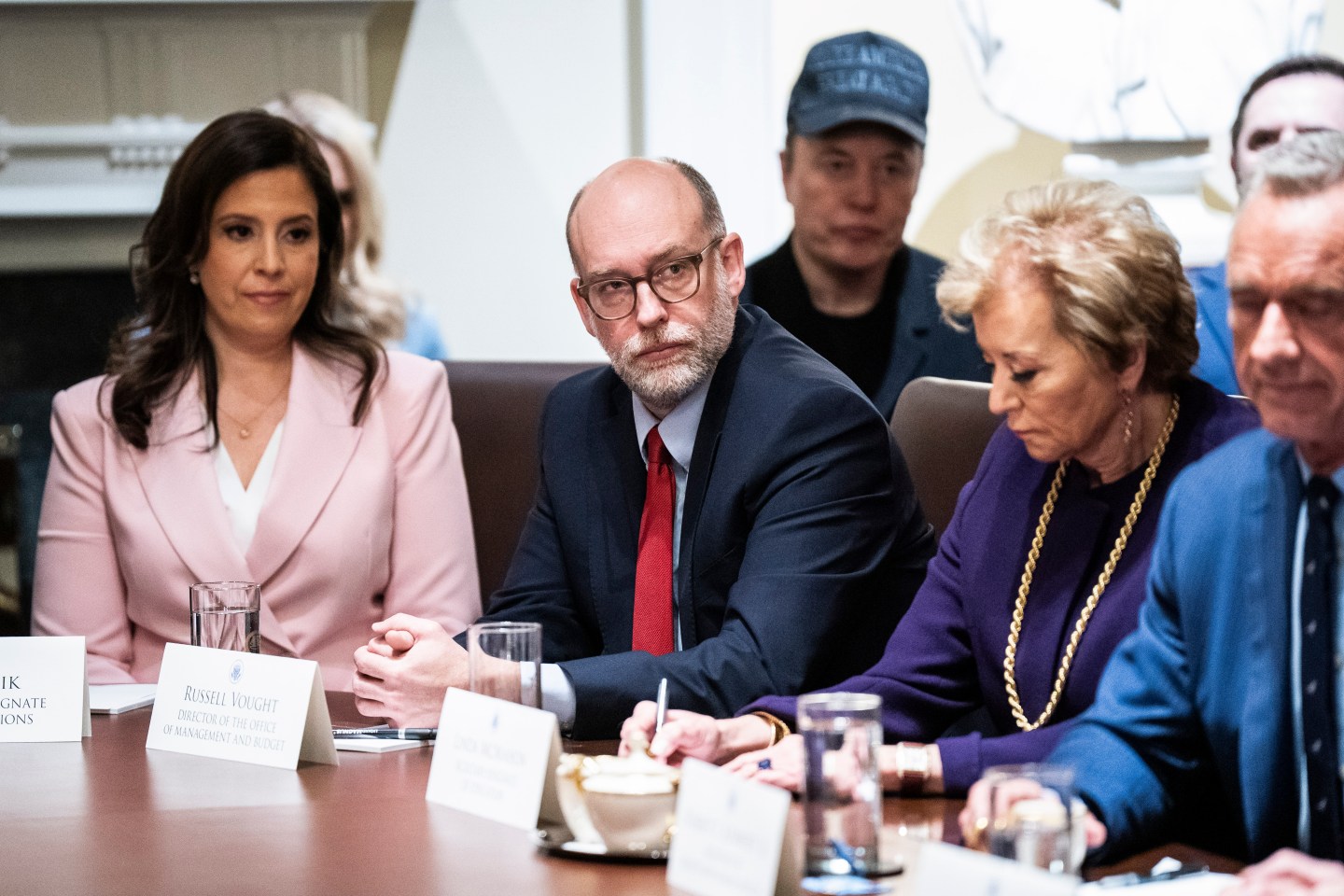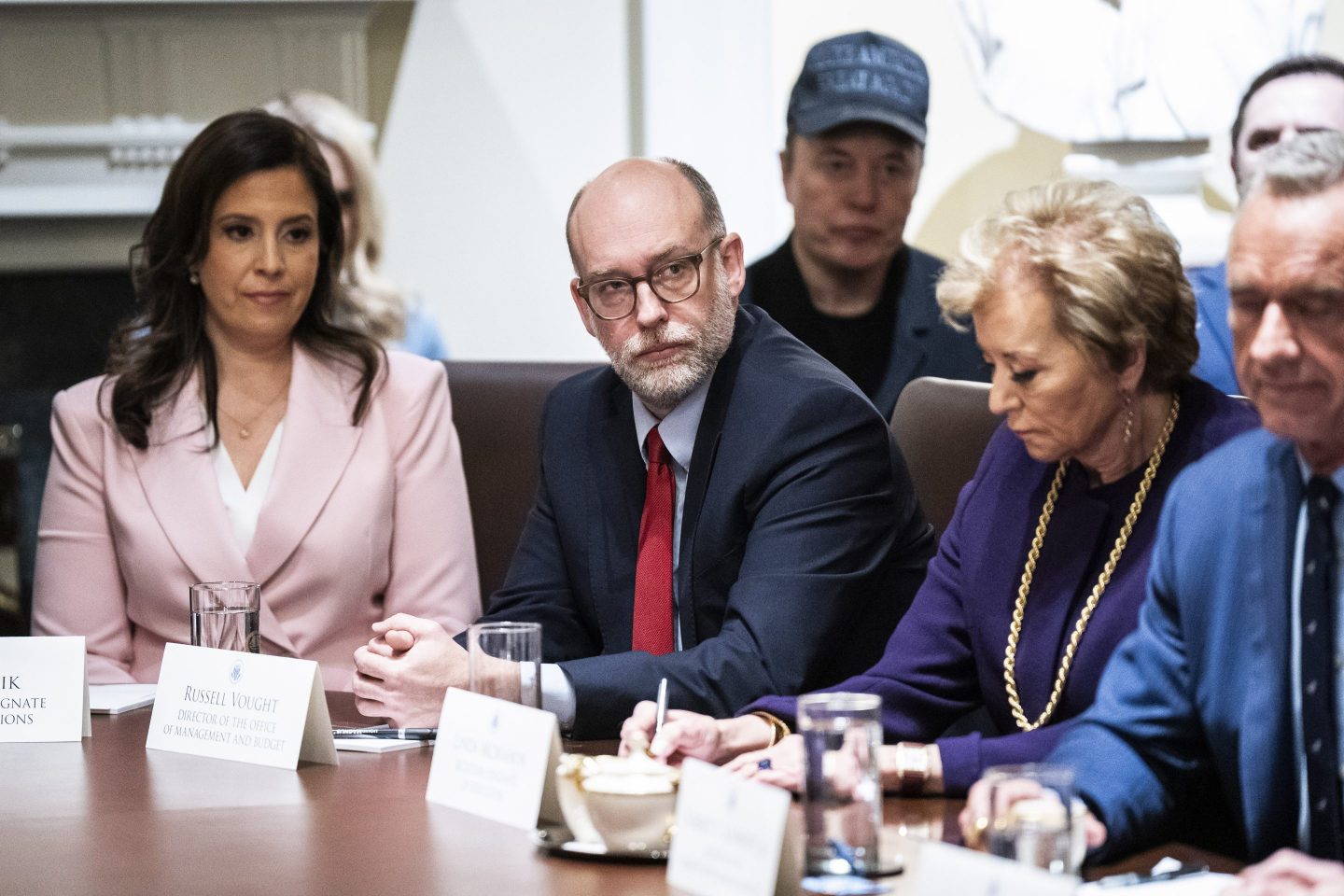Good morning. Stocks soared yesterday after the U.S. said it would reverse course and pause for 90 days most import tariffs for all nations except China.
Virtually every major tech company’s stock was up by double-digit percentages; it was the S&P 500’s best day since 2008.
(“Most” because a baseline 10% tariff remains in effect. “Except China” because the duty on that country’s goods was raised yet again to 125%. Is your head spinning yet? You’re not alone.)
Wondering how this will affect the thousands of small businesses in the U.S. who rely on China to manufacture their goods? Fortune’s Jason Del Rey spoke with Boise-based Harkla, which makes products for kids with special needs, about the outlook. In a word: dire. —Andrew Nusca
Want to send thoughts or suggestions to Fortune Tech? Drop a line here.
New U.S. AI policies require federal agencies to prioritize domestic companies for contracts

U.S. Office of Management and Budget director Russ Vought sent out memos to federal agencies last week laying out the Trump administration’s new AI policies.
The communications instruct U.S. agencies to prioritize AI products built in the U.S. and remove some of the safety requirements that were put in place during the Biden administration.
They also allow agencies to use pre-existing approval processes in place for other government IT in a bid to streamline the effort.
The biggest differences between Vought’s memos and the Biden-era directives lie in the approach to risk, according to Gordon Bitko, executive vice president of policy of the Information Technology Industry Council, a trade organization representing the tech industry.
The new memos make the argument that “failure to innovate and implement AI at scale in the government” is actually a “bigger risk than improper use of AI,” Bitko told Fortune in an email.
While the Biden-era OMB memo focused on potential impact to rights or safety of citizens, Vought’s memo gives agencies more flexibility to decide for themselves what would be considered a “higher-impact” AI use case—evaluate risks for themselves and handle it accordingly.
The new memos also emphasize for the first time that agencies must prioritize AI products built in the U.S.
Apart from these items, these new memos actually have a lot in common with their Biden-era counterparts. Both administration’s directives require agencies to have Chief AI Officers, to track how the agencies are using AI, develop policies to remove barriers for implementing AI, and publish their compliance plans on agency websites. —Jessica Mathews
Former Facebook exec says company undermined U.S. national security with China
Former Facebook executive Sarah Wynn-Williams on Wednesday accused Meta of undermining U.S. national security and briefing China on American artificial intelligence efforts in a bid to boost its business there.
“During my time at Meta, company executives lied about what they were doing with the Chinese Communist Party to employees, shareholders, Congress, and the American public,” Wynn-Williams said in testimony before the Senate Judiciary Committee.
Wynn-Williams’ account of her time at the company, Careless People, became a bestselling book that Meta tried to discredit. She was director of global public policy from 2011 to 2017.
“I saw Meta executives repeatedly undermine U.S. national security and betray American values,” she testified. “They did these things in secret to win favor with Beijing and build an $18 billion business in China.”
Wynn-Williams said Meta, under pressure from China, deleted the Facebook account of a prominent Chinese dissident living in the U.S.
She also said Meta “ignored warnings” that building a “physical pipeline” between the U.S. and China would provide China with backdoor access to U.S. user data. (The plan never came to fruition.)
In a statement to the Associated Press, Meta said Wynn-Williams’ testimony was “riddled with false claims” and said the company does “not operate our services in China today.” —AN
Meta’s new rules block teenagers from livestreaming on Instagram
Speaking of Meta: The company’s continuing battle to shed criticisms about how it handles young users has resulted in new rules for teens on Instagram.
People under the age of 16 will be blocked from livestreaming on the social network unless they first get parental approval. Parents will also be the only ones who can turn off a feature that blurs images containing suspected nudity in direct messages sent to young users.
The updates will be made in the next couple of months, Meta said.
In addition, the company said it is expanding teen accounts to Facebook and Messenger.
Meta says some 54 million people under the age of 18 use its Instagram teen accounts. The vast majority (over 90%) of 13- to 15-year-olds make no changes to the default restrictions, it said.
Teen accounts first rolled out last year, requiring anyone over 16 years old on Instagram to join. Current Instagram users who fell in the age range were automatically placed into the teen accounts as well.
Teen account holders are automatically opted into the highest privacy settings, which prohibit them from messaging strangers and make their accounts private. Those settings cannot be changed without the approval of a parent.
Meta has been on the defensive about how it handles young users since a whistleblower leaked internal documents suggesting Facebook knowingly prioritized profit over well-being and safety. The controversy led to congressional testimony and spurred debate about what could be done to protect minors online. —Chris Morris
More tech
—U.K. creates precrime tool. Algorithms to determine who’s most likely to commit murder.
—Nvidia’s Mar-a-Lago maneuver. U.S. H20 chip export restrictions to China reportedly reversed after Jensen Huang promises new U.S. investments.
—Samsung, Google debut Ballie. A ball-shaped home robot à la Star Wars’ BB-8, coming later this year.
—Nintendo postpones Switch 2 launch in China. Wait-and-see approach in a country that strictly regulates gaming.
—Amazon abandons China-made products. Orders for chairs, scooters, air conditioners, and more reportedly canceled in the wake of the trade war.
—EU unveils AI Continent Action Plan. A playbook to build “AI gigafactories” to catch up with the U.S. and China.
—Dell, HP, Lenovo’s high-end product push. The gadget makers reportedly pressured their supply chains for high-price products to beat tariff escalation.














